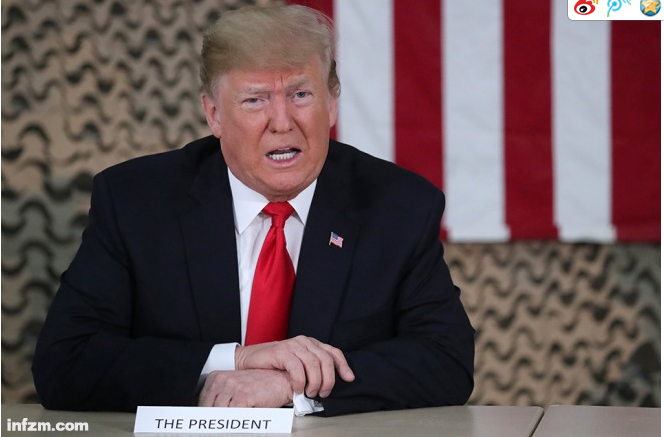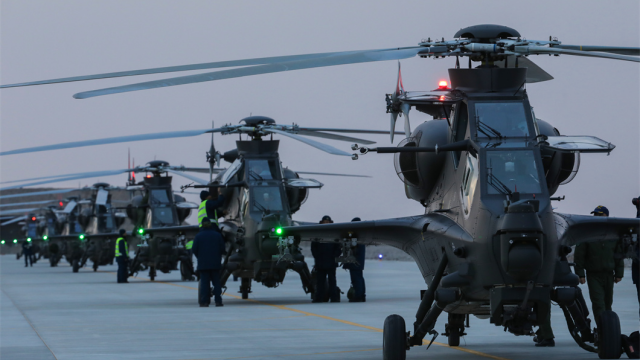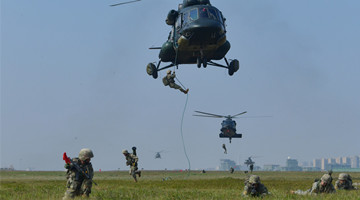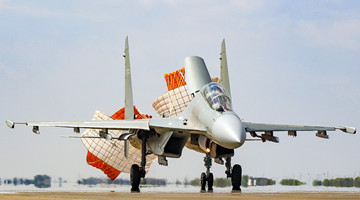
US President Donald Trump.(Xinhua/Reuters)
“The United States cannot continue to be the policeman of the world, and we’re no longer the suckers of the world.” Since December 26, 2018, US President Donald Trump has publicly demanded the US allies to split its defense expenditures for at least four times.
This move mainly targets at the US' two major allies in Asia—Japan and the Republic of Korea (ROK). However, it seems that the two Asian countries won't respond to Trump's call. In this context, Trump pushed harder by posting on his tweeter account: "Now it's time to pay!"
Japan: seeking extrication from military dependence on the US?
Facing Trump's demand for higher payments, Japan seems to respond with a positive attitude, but refused to pay the money directly. The Yomiuri Shinbun reported on January 9, 2019 that the Japanese government decided to buy Mageshima Island in southwestern Japan for 16 billion yen (about RMB 1 billion yuan) and build it into a base for the US Navy to conduct carrier-borne aircraft training.
This is a strategy of hitting two birds with one stone. Japanese Chief Cabinet Secretary Yoshihide Suga said at a press conference on January 9 that the completion of the Mageshima base would not only "reinforce the defense system in southwestern Japan," but also could enable it to "be shared by the Japanese Self-Defense Forces and the US troops in Japan."
Every time when the US demands splitting defense expenditures, the Japanese government usually responded with an announcement to buy more arms from Washington. In Japan's 2018 fiscal budget, all expenditures were shrunken except for defense spending. The budget for buying US military equipment even increased. An article published in the Japanese newspaper Nikkan Gendai called this a move to "please President Trump."
From a businessman to the US president, Trump has been committed to touting for American weaponry around the world since he took office. Of its allies, Japan and Saudi Arabia are among the few with the economic power and willingness to buy.
"The US continues requiring Japan to buy its weapons, and the ties between two countries are more like a relationship between a franchisee and a general distributor—as a 'franchisee', Japan is asked to buy more and more commodities and will eventually be forced to go bankrupt.” The Tokyo Shimbun described the “seller-buyer” relationship between the US and Japan like this, and doubted the Abe government’s statement that "Japan and the US are equal allies."
Over the years, in fact, Japan has secretly developed its own military equipment through purchasing weapons from the US, so as to constantly enhance its military strength and reduce its security dependence on Washington.
Since 2012, the US has revised its trade rules with Japan several times and forced the latter to buy its weapons. Gradually, Japan became the world's second largest debtor from the largest creditor. The latest data released by the International Monetary Fund (IMF) indicates that Japan's debt has reached 239 percent of its Gross Domestic Product (GDP).
Despite its deferential attitude towards Washington in the realm of security—at least in surface, Japan has skillfully concealed its restless ambitions in economic and diplomatic fields. Recently, Japan has begun to promote the Comprehensive and Progressive Agreement for Trans-Pacific Partnership (CPTPP) and has constantly enhanced its military cooperation with Southeast Asian countries and the EU.
ROK: no compromise on military expenditures
On the Korean Peninsula, Trump's demand for higher payments of military expenditures was rejected by the ROK. The ROK government took a hardline stance, saying that it would not only pay more for US troops in its territory, but also reduce the number and scale of joint military exercises.
"The US demand for higher payments of defense expenditures is excessive," said an official from the ROK as quoted by The Chosun Ilbo. During the 10th round of defense cost-sharing talks between Washington and Seoul in December 2018, representatives from both sides fell into fierce debates, causing negotiations to break several times.
The news sparked large-scaled demonstrations across the ROK. Against the backdrop of sluggish economic growth and deteriorated people's living standards in the ROK, the general public opposes the US troops stationed in the ROK and feels disappointed at the current government's policy towards the US.
Washington required the ROK to considerably increase its share of the cost of US troops stationed in the country to about two times the current figure.
In 2018, the ROK paid 960.2 billion won (about RMB 5.88 billion yuan) for maintaining the US forces in the country, which equaled to half of the total cost of US troops stationed there. If taking into account the free facilities and land provided by the ROK as well as taxes exempted, in fact, Seoul undertakes 60-70 percent of the military cost.
The ROK's fiscal budget suffers a lot from US troops in the country. Moreover, it contributed 91 percent of the 1.2 trillion-won construction cost of the US military base in Pyeongtaek. In recent years, Seoul invested huge amounts in the deployment of the US Terminal High Altitude Area Defense (THAAD) system, and this move also sparked outrage among its neighboring countries, which then took countermeasures against the ROK.
The foresaid expenditures are all excluded from ROK's contribution to the share of defense costs, so is its spending on buying US weapons.
During the recent talks on the defense cost-sharing agreement between the US and the ROK, American negotiators suggested signing a one-year contract, instead of the current five-year deal. Since the two sides signed their first military cost-sharing deal in 1991, this was the first time that the US proposed a one-year contract. The last (ninth) cost-sharing deal had a valid period of five years.
This means that the US will probably ask the ROK to further increase its contribution to the cost of stationing US forces in its territory. The ROK newspaper Dong-A Ilbo quoted a diplomatic expert saying that the US intends to sign a one-year contract before forging a new defense cost-sharing system involving its allies such as the ROK, Japan, and NATO.
In early 2018, Trump announced that it was "unnecessary for the US to spend US$3.5 billion a year to keep troops in ROK" and threated to retreat the US troops stationed in the Asian country. However, then-US Secretary of Defense James Mattis stopped Trump, who said that "deploying US troops there aims to prevent the Third World War."
The Trump administration lowers recognition of the value of US-ROK alliance
As early as 2016 when he ran for president, Trump already rebuked some countries "taking the free ride in security" and proposed that "US allies undertake 100 percent of relevant defense costs."
Since he took office, President Trump has constantly reduced the number of US overseas military bases, repeatedly asked its European allies to increase their shares of military spending and to enhance their own national defense capacity, and required its Asian allies to pay more for the stationing of US troops.
"For a long time, contained by the diplomatic and security core team called the 'axis of adults' comprised of defense secretary James Mattis and others in the US government, Trump has remained at a stage of making provocative voices,” according to ROK media.
Given that Mattis quit his position at the Pentagon in December 2018, the ROK began to worry that "Trump's rising neo-isolationism will become more reckless." At present, with the alleviating tension on the Korean Peninsula, Trump lowers his recognition of the value of US-ROK alliance.
Trump’s hardline stance towards the ROK is rooted in the US' military power. In an article published in The Hill, American scholar David Maxwell wrote: "If he [Trump] doesn’t [accept a compromised plan], US troops may soon be departing from the Korean Peninsula. It would be a tragic and abrupt end to the ROK-US strategic alliance.”
"The ROK would be the biggest victim," noted Shin Beom-chul, a senior fellow at the Asan Institute for Policy Studies in Seoul, ROK, "US and Japanese leaders only emphasized their own national interests, jeopardizing the US-Japan-ROK trilateral security cooperation relationship. Out of its worry about Democratic People's Republic of Korea (DPRK), the ROK government turns a blind eye to this trend."
During the period of the Obama administration, the US insisted on building a US-Japan-ROK security alliance system nicknamed the "mini NATO" in East Asia.
But now, as ROK media commented, Trump is asking allies to pay more for US troops stationed in those countries, signifying that such alliance relationship is facing choice and coordination of "helping whom."
Moreover, issues like forced labor and "comfort women" that have been pending for decades are devastating people-to-people contacts between the ROK and Japan.
A survey conducted by The Nihon Keizai Shimbun reveals that 69 percent of Japanese entrepreneurs and 45 percent of ROK entrepreneurs consider wartime forced labor under Japan's colonial rule a primary reason for the alienation of the two countries.
Recently, security frictions between Japan and the ROK are escalating. On October 21, 2018, members of ROK's National Assembly ascended a disputed island over which both the ROK and Japan claim sovereignty.
On November 20, the Korea Coast Guard (KCG) and a Japanese fishing boat fell into a standoff on disputed waters. On December 20, the alleged incident that "an ROK destroyer used fire-control radar to lock on a Japanese patrol aircraft on the Sea of Japan" caused the already-tense Japan-ROK relations to drop to a new low. The two sides remain in a fierce wrangle over the incident.
Disclaimer: The author is Han Huayi, reporter with the www.infzm.com. The article is translated from Chinese into English and edited by the China Military Online. The information, ideas or opinions appearing in this article are those of the author from the www.infzm.com. and do not reflect the views of eng.chinamil.com.cn. Chinamil.com.cn does not assume any responsibility or liability for the same.









